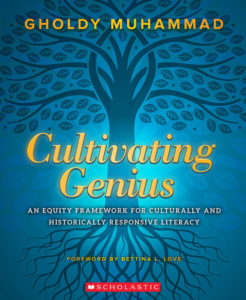Cultivating Genius: An Equity Framework
Cultivating Genius: An Equity Framework for Culturally and Historically Responsive Literacy
By Gholdy Muhammad
(Scholastic, 2020 – Learn more)

Like most teachers in America, I am white. Our teaching force is not even close to reflecting the racial diversity of our students, where approximately 80% of educators are white, but more than half of our student population is not.
Years ago one of my former students commented that when teachers told her that they don’t see color, she felt they weren’t seeing her. Plus, she added, “There is nothing wrong with being Black.” In order to teach children well, we must truly see them and their experiences.

As our country reconciles with its past and struggles with who it wants to be in the future, now is the time to reflect and re-examine our own classroom practices and school policies in order to create a more equitable school community for our Black students.
How Historically Responsive Literacy can help
Cultivating Genius by former K12 teacher and Associate Professor Gholdy Muhammad is one text that can be used to support these efforts. It contains eight chapters and is organized into three parts with lesson samples spanning content areas, making it both accessible and reader friendly.
In addition, at the end of each chapter, Muhammad includes separate questions geared towards educators/pre-service teachers and school leaders, to generate personal reflection or discussion, depending on how the text is being used.
The book opens by introducing readers to the theory and model of Historically Responsive Literacy (HRL). Essentially, HRL is a shift in programming where social context and cultural identities become more relevant or central to our work. This switch only heightens student engagement.
“The HRL Framework advances the Common Core State Standards by moving beyond just skills and knowledge. This calls for a shifting of schools’ curriculum and lesson planning to be inclusive of Black history, as we prepare preservice teachers and support practicing teachers. When these four learning goals [identity development, skill development, intellectual development, criticality] are taught using excellent methods of teaching, learning becomes humanizing. . . .Collectively, these four pursuits are also intended to restore the power, energy, and originality of teachers and leaders” (157-8).
Moving to the forefront for equity
Muhammad wants us to move into action. She calls out to “armchair revolutionaries who profess their support for change but only look at it comfortably from their chairs. We need teachers who are on the front lines modeling, guiding students, participating, and doing what we ask of students” (78).
This will look different for all of us. Some of us may re-envision the entire curriculum; for others may only involve a shift. Some of us are going to start change within our own classrooms and departments, while others might be expanding into their school community. Are you ready to answer Muhammad’s call?
Cultivating Genius is grounded in the work of Black literary societies, and I am certain that our Black students will benefit from implementing Historically Responsive Literacy. Muhammad advocates for a celebration of learning, where educators layer texts by taking a multi-modal approach, demonstrating that utilizing this framework can benefit all of the students on your roster.
Ultimately, Gholdy Muhammad is looking for collaborative transformation in an education system that has remained largely stagnant. I gained critical insight from this book and remain energized by it. As an educator, if you are looking for ways you can contribute to racial justice, you might start by reading Cultivating Genius.
Nicole Warchol has been teaching middle school for more than a decade. She is a former NCTE Lead Ambassador and current board member for the New Jersey Council of Teachers of English. She is an Aquarius and so from birth she was destined to contain multitudes. Nicole is also a Ravenclaw who on occasion writes poetry and does yoga with puppies. She tweets from @MsNWarchol.






























